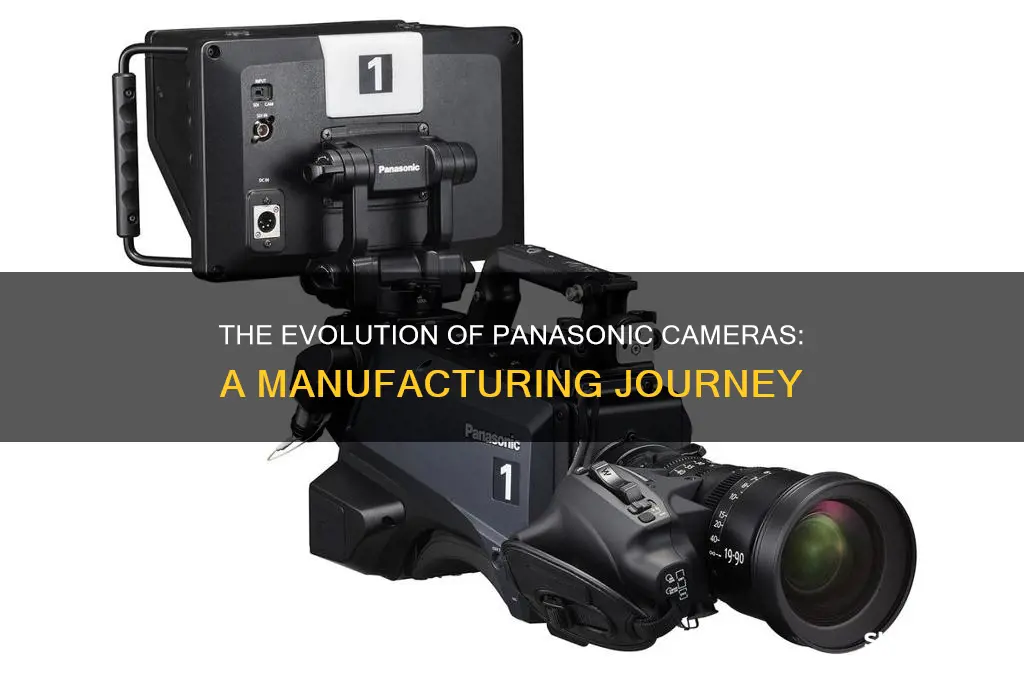
Panasonic is a Japanese multinational electronics company that was founded in 1918 and is headquartered in Osaka, Japan. The company has a wide range of products, including cameras, and is known for its quality and innovation. In recent years, there have been reports of Panasonic selling its security camera factory in China and possibly exiting the camera business altogether. The company's camera market share is around 4.4%, and it faces competition from Chinese rivals in the surveillance camera market.
| Characteristics | Values |
|---|---|
| Company | Panasonic |
| Company Type | Japanese multinational electronics company |
| Headquarters | Kadoma, Osaka, Japan |
| Year Founded | 1918 |
| Founder | Kōnosuke Matsushita |
| Current CEO | Yuki Kusumi |
| Product Range | Cameras, rechargeable batteries, automotive and avionic systems, industrial systems, home renovation and construction |
| Camera Manufacturing Locations | Japan, China, Indonesia, India, Thailand |
What You'll Learn

Panasonic cameras are made in Japan, China, and Indonesia
Panasonic is a Japanese multinational electronics company, founded in 1918 and headquartered in Osaka, Japan. The company has a long history of innovation and is known for its diverse range of products, including cameras.
Panasonic's presence in the camera industry can be traced back to its early days, when it began branding audio speakers and lamps as "PanaSonic" for markets outside of Japan. Over time, the company refined its branding and expanded its product offerings.
Today, Panasonic's camera manufacturing facilities are spread across multiple countries. One notable location is the Yamagata Lens Factory in Tendo City, Japan. This factory, established in 1982, is known for its highly automated processes and precision glass molding techniques. It produces glass and plastic aspherical lens elements with exceptional accuracy, achieving tolerances of less than 1 micron.
In addition to its Japanese operations, Panasonic has a presence in China. While there have been reports of Panasonic selling its security camera factory in Suzhou, China, due to disappointing sales outside Japan, the company still maintains a significant camera manufacturing footprint in the country.
Furthermore, Panasonic has expanded its manufacturing operations to Indonesia through a joint venture with the Gobel Group, known as PT Panasonic Gobel Indonesia. This division is based in Cawang, East Jakarta, and plays a crucial role in Panasonic's camera production.
The company's global presence allows it to leverage different strengths and resources from each region, contributing to its overall camera manufacturing capabilities.
Camera Battery Drain: Why It Happens and How to Fix It
You may want to see also

Panasonic is a Japanese multinational electronics company
Panasonic offers a wide range of products and services, including rechargeable batteries, automotive and avionic systems, and industrial systems. The company has a primary listing on the Tokyo Stock Exchange and is a constituent of the Nikkei 225 and TOPIX 100 indices. It also has a secondary listing on the Nagoya Stock Exchange.
In addition to its headquarters in Japan, Panasonic operates factories and facilities in various countries, including China, the United States, the United Kingdom, Germany, Singapore, and Malaysia. The company has a global presence and sells its products worldwide.
Panasonic's camera business has faced challenges in recent years, with reports suggesting that the company may exit the camera market due to disappointing sales and increasing competition. However, Panasonic continues to innovate and develop new camera models, such as the Lumix series.
The company has a long history of technological advancements and has been a top-level sponsor of the Olympic Games since the Seoul Olympics in 1988. Panasonic's commitment to research and development is evident, with investments in various fields, including artificial intelligence and machine learning.
Understanding DVR Mode on Trail Cameras
You may want to see also

Panasonic's Yamagata lens factory is highly automated
Panasonic's Yamagata lens factory is a highly automated facility that produces glass and plastic aspherical lens elements. The factory was established in 1982 and began manufacturing spherical lens elements in 1987, followed by aspherical optical elements in 1989. Today, the factory employs 484 people and produces glass aspherical elements ranging from 1 to 75 mm in diameter and plastic aspherical elements from 2 to 38 mm in diameter.
The process of manufacturing aspherical lens elements at the Yamagata factory is highly automated and involves precision glass molding. Instead of using traditional grinding and polishing techniques, Panasonic uses molds made from a very hard, heat-resistant material, possibly ceramic. These molds are machined to the reverse shape of the optical element and finished by hand by highly skilled technicians to tolerances of less than 1 micron, eliminating any ridges that could contribute to the "onion ring" bokeh effect.
Once the mold is ready, blanks of glass are heated to around 700-1000 °C until they soften and become malleable. The mold then squeezes together under high pressure, forming the finished lens element to a tolerance of less than 2 microns in a matter of seconds. This process is much faster than traditional polishing, which can take hours.
In addition to its highly automated lens manufacturing capabilities, the Yamagata factory also has advanced lens inspection and measurement equipment. Panasonic uses its original UA3P (Ultra-Accurate 3D Profilometer) instrument, which boasts a measuring accuracy of 1/10,000 mm, for lens inspection. The factory also has quality assurance systems that have been approved by Leica Camera AG, and Panasonic has established its own standards for inspecting lenses for factors such as ghosting, flaring, coating color, and bokeh effect.
Troubleshooting 101: Camera and Charger Malfunctions
You may want to see also

Panasonic sold its Suzhou, China security camera factory in 2019
Panasonic, a Japanese multinational electronics company, sold its Suzhou, China security camera factory in 2019 to Polaris Capital Group, a Tokyo-based investment fund. The sale was a result of disappointing sales outside of Japan and the desire to reduce costs by procuring cameras from other sources. The factory in Suzhou, a city in southeast China's Jiangsu province, was expected to fetch over 50 billion yen ($468 million) in the deal.
The decision to sell the security camera business was made to lighten the financial burden on Panasonic as it faced fierce competition from Chinese rivals in the surveillance camera market. The company expected to gain over 30 billion yen ($273 million) from the sale, which could be invested in other key business areas such as automotive batteries.
The sale of the Suzhou factory is part of Panasonic's strategy to focus its resources on the automotive and industrial businesses. In recent years, the company has also exited other businesses, such as the vending machine business, and sold its semiconductor and security systems businesses.
Panasonic's history with its security camera business dates back to at least 2018 when the company was considering selling the Suzhou factory. At the time, Panasonic was the exclusive battery cell supplier for Tesla's Model 3 sedan and was aiming to expand its range of advanced driving-related products. The company has since reduced its dependence on Tesla by partnering with Toyota Motor Corp to develop and supply batteries for electric vehicles.
Shipping a Camera With Battery: The Safe Way
You may want to see also

Panasonic may exit the camera business
Panasonic, a Japanese multinational electronics company, has been facing challenges in its camera business. In 2021, there were reports that Panasonic might exit the camera business, similar to its competitor, Olympus. This decision was speculated to be driven by the company's focus on restructuring its unprofitable divisions, including televisions and digital cameras.
Panasonic's camera market share was around 4.4%, with an annual production of approximately 390,000 cameras. The company faced competition from Chinese and South Korean brands, as well as the increasing popularity of camera phones, which contributed to the decline in compact camera sales.
However, it is important to note that Panasonic has not confirmed its exit from the camera business. In 2017, there were similar speculations, but Panasonic continued to operate in the camera market. The company has a diverse range of products, including mirrorless video cameras like the GH series, which have been commercially successful and well-received by consumers.
In recent years, Panasonic has shifted its business strategy by prioritizing video-focused hybrid and specialist cameras while reducing its focus on compact and stills-focused cameras. This shift aligns with the company's goal to achieve growth in other areas, such as portable televisions, headphones, and intercoms.
While the future of Panasonic's camera business remains uncertain, the company has a history of adapting to market changes and exploring new opportunities.
In-Camera Noise Reduction: RAW Files Affected?
You may want to see also
Frequently asked questions
Panasonic is a Japanese multinational company headquartered in Osaka, Japan. It has factories in Japan, China, and Malaysia. Some Panasonic cameras are manufactured in China, while others are assembled in Okayama, Japan.
Panasonic has chosen to manufacture some of its products in China due to the lower labor costs. The company also has its own factories in China, allowing for greater control over quality compared to outsourcing to third-party manufacturers.
There have been reports and speculations that Panasonic may exit the camera business due to disappointing sales and financial losses. However, as of my last update in September 2024, Panasonic has not made any official announcements regarding this matter.







